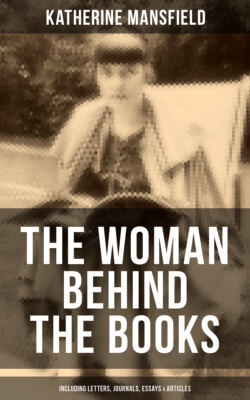Читать книгу Katherine Mansfield, The Woman Behind The Books (Including Letters, Journals, Essays & Articles) - Katherine Mansfield - Страница 62
На сайте Литреса книга снята с продажи.
4
ОглавлениеOne thing which the whole family shared was its pleasure in music. The father had always enjoyed it, the mother was something of a pianist, and the three older girls were talented. Kathleen had composed poems for Vera to set to music, and Marie to sing. Their uncle, Mr. Waters, had sung them when the girls were at Queen’s, and they were a feature of the musical evenings, now, in the big bare music-room at 47, when the trio played: Kathleen the’cello, old Mr. Trowell the violin, and various different friends the piano.
Kathleen had been studying the’cello again under old Mr. Trowell. For a while, the three girls had a plan to attend a convent at Island Bay — Vera to take piano lessons, Kathleen to continue with her’cello, and Marie to do needlework. On the way to make arrangements, they waited some time for a car; when finally a workman’s car came by, Vera said to the motor-man:”Do you think we can manage to take this?” Afterward, Kathleen flared at her:”How could you talk that way to him? We’re all alike! I wish I was covered with mud!”
Since the Island Bay plan did not materialise, Kathleen continued with her trio practice in Wellington. Neighbours remember her passing swiftly down Tinakori Road — the cumbersome ‘cello apparently no burden — and singing as she sped down the hill. They exchanged glances, some of them, and laughed:”Aren’t they putting on a lot of style with those big instruments!”
It had been made somewhat difficult for the girls on their return from London, not because their father was a self-made man — in this young country everyone was self-made — but he had made himself more rapidly than most, and when, after the girls’ return,”he took that big house in Fitzherbert Terrace,” some Wellington circles resented it. Nor was it customary, at that time, for girls to be sent “home” to England to be educated. The immediate consequence of this estrangement was that they were thrown back, more than ever, upon their own family life, and upon their immediate friends.
Their musical evenings — an outstanding institution in a community dependent entirely upon its own resources for diversion — often ended with a dance. Thrilling event! Years later Kathleen could capture even the anticipation of “a family dance” :
“The excitement began first thing that morning by their father suddenly deciding that, after all, they could have champagne. What! Impossible! Mother was joking!
“A fierce discussion had raged ever on this subject since the invitations were sent out, Father pooh-poohing — and refusing to listen, and Mother, as usual siding with him when she was with him: (‘Of course, darling: I quite agree’) and siding with them when she was with them: (‘Most unreasonable. I more than see the point.’) So that by the time they had definitely given up hope of champagne, and had focussed all their attention on the hock cup instead. And now, for no reason whatever, with nobody saying a word to him — so like Father! — he had given in.
“‘It was just after Zaidee had brought in our morning tea. He was lying on his back, you know, staring at the ceiling, and suddenly he said:”I don’t want the children to think I am a wet blanket about this dance affair. If it’s going to make all that difference to them, if it’s a question of the thing going with a swing or not going with a swing I’m inclined to let them have champagne. I’ll call in and order it on my way to the Bank.”’
“‘My dear! What did you say?’
“‘What could I say? I was overcome. I said:”That’s very generous of you, Daddy dear,” and I placed the entire plate of cut bread and butter on his chest. As a kind of sacrifice to the darling. I felt he deserved it and he does so love those thin shaves of bread and butter.’
“‘Can’t you see the plate,’ cried Laurie, ‘gently rising and falling on his pyjama jacket?’
“‘They began to laugh, but it really was most thrilling. Champagne did make all the difference — didn’t it? Just the feeling it was there gave such a different…. Oh, absolutely!”
It was not of this, but of another sketch from the same period of memory — Her First Ball — that she said:
“I have been writing about a dance this afternoon, and remembering how one polished the floor was so thrilling that everything was forgotten.”
Then there was the dance itself — the big bare, flower-filled room, cleared; an impromptu orchestra playing by the lamplight which threw such shadows over the wide sleeves and top-knots of the girls; and the boys whom they had known all their lives — now half grown, stiff in “Sunday suits,” coming to ask for the waltzes and lancers; Siegfried Eichelbaum, Cheviot Bell,”Chummie,” and the Nathans who used to live next door.
George Nathan asked Kass for a dance on one of these evenings.
She answered abruptly:”I know you hate me! Why do you ask me to dance?”
He was surprised, but not nonplussed, being one of those stout, hearty lads who laugh easily.
“But I don’t hate you!” he said.
And he didn’t. He was thinking he couldn’t say she was attractive. He liked the slinky type, and she was plump, and had a quick way of speaking at you so you never knew what she was going to say.”She frightens people away,” he decided, as he crossed the room for another of Godber’s meringues.
